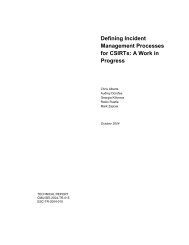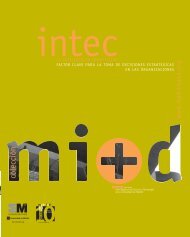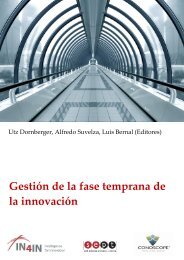The Global Innovation Index 2012
The Global Innovation Index 2012
The Global Innovation Index 2012
Create successful ePaper yourself
Turn your PDF publications into a flip-book with our unique Google optimized e-Paper software.
cHApTEr 5<br />
<strong>The</strong> Role of Coherent Linkages in Fostering <strong>Innovation</strong>-Based Economies in<br />
the Gulf Cooperation Council Countries<br />
Barry jaruzelSKi, chaDi n. moujaeS, raSheeD eltayeB, haDi raaD, and hatem a. Samman, Booz & company<br />
Developed countries around the<br />
world with strong innovation cultures<br />
have succeeded by linking people,<br />
capital, and research to introduce<br />
novelty and create economic<br />
value. <strong>The</strong>se countries have an effective<br />
integrated network of stakeholders<br />
that foster an environment<br />
that can transform ideas into successful<br />
outcomes. <strong>The</strong> web of stakeholders<br />
acts as a vibrant innovation<br />
ecosystem. This system, rather than<br />
specific institutions focused on a single<br />
discipline, spurs widespread economic<br />
activity, drives efficiency and<br />
productivity, and increases overall<br />
standards of living. Countries with<br />
strong innovation capabilities have<br />
resilient economies that can withstand<br />
periodic economic shocks to<br />
individual sectors.<br />
In recent years, the countries of the<br />
Gulf Cooperation Council (GCC)—<br />
Bahrain, Kuwait, Oman, Qatar, Saudi<br />
Arabia, and the United Arab Emirates<br />
(UAE)—have embarked on a series<br />
of reforms and initiatives targeted at<br />
immediate challenges within their<br />
innovation systems. <strong>The</strong>se challenges<br />
include need to cultivate human<br />
capital and to promote research and<br />
development (R&D). <strong>The</strong>se countries<br />
are also developing traditional sectors<br />
(such as oil and gas, petrochemicals,<br />
basic industries, and water desalination)<br />
and nascent ones (including<br />
aerospace, healthcare, and renewable<br />
energy). <strong>The</strong> GCC has made significant<br />
progress in a relatively short time.<br />
To ensure further progress<br />
in these efforts, the GCC countries<br />
must now institute a national<br />
model that establishes coherent linkages<br />
in their innovation systems.<br />
This involves forging strong ties<br />
among all stakeholders in the innovation<br />
ecosystem (which encompasses<br />
policies, operations, and all<br />
stakeholders). This is vital for the<br />
GCC states, which have rich natural<br />
resource endowments, large governments,<br />
and a need to diversify<br />
their economic base. Policymakers<br />
in the GCC are well aware that the<br />
resource endowment is finite. <strong>The</strong>y<br />
know that they need to invest the<br />
current windfall wisely in developing<br />
knowledge-based economies.<br />
<strong>The</strong> crucial mechanism required<br />
is an innovation-promotion entity.<br />
This body establishes and develops<br />
the necessary linkages, coordinates<br />
policy, convenes stakeholders, and<br />
drives the national agenda.<br />
Key elements for promoting innovation<br />
<strong>The</strong> GCC needs to foster innovation<br />
to diversify its economic base,<br />
reduce its dependence on hydrocarbons,<br />
and create opportunities for its<br />
large number of young citizens.<br />
• <strong>The</strong> GCC has made marked<br />
strides in creating innovationbased<br />
economies. However, it<br />
still lags behind developed countries<br />
and has room to improve<br />
its global rankings by creating<br />
vibrant, entrepreneurship-friendly<br />
environments.<br />
• Overall, the GCC needs to forge<br />
ties that bring together all the<br />
stakeholders in the innovation<br />
ecosystem—academics, regulators,<br />
multinational companies,<br />
and entrepreneurs among them—<br />
in a cohesive, targeted program<br />
aimed at fostering innovation.<br />
• <strong>The</strong> creation of coherent links is<br />
vital to establishing an innovation<br />
economy. <strong>The</strong> process must<br />
involve an innovation-promotion<br />
entity that fuses policies, stakeholders,<br />
and operations into a<br />
focused effort.<br />
Transitioning to an innovation economy<br />
<strong>The</strong>re are three reasons GCC countries<br />
must move towards innovationbased<br />
growth: economic diversification,<br />
demographics and the engagement<br />
of youth, and globalization.<br />
Economic diversification<br />
GCC countries realize that sustainable<br />
long-term economic development<br />
hinges on their ability to<br />
decrease reliance on hydrocarbon<br />
income and to widen their economic<br />
base. <strong>The</strong> GCC countries<br />
must become innovative. <strong>The</strong>y have<br />
to respond promptly to current and<br />
expected demands for goods and<br />
services if they are to diversify their<br />
economies in a competitive manner.<br />
109<br />
THE GLOBAL INNOVATION INDEX <strong>2012</strong> 5: <strong>The</strong> Role of Coherent Linkages






